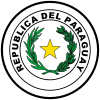Flag of Paraguay
 | |
| Use | National flag and ensign |
|---|---|
| Proportion | 11:20 |
| Adopted | 1842 (last modified July 15, 2013) |
| Design | A horizontal triband of red, white and blue, defaced on the obverse with the coat of arms of Paraguay. |
 | |
| Use | Reverse flag |
| Proportion | 11:20 |
| Design | A horizontal triband of red, white and blue, defaced on the reverse with the reversed coat of arms of Paraguay. |

The current design of the flag of Paraguay (Spanish: bandera de Paraguay; Guarani: Paraguái poyvi) was first adopted in 1842.[1] Its design, a red–white–blue triband, was inspired by the colours of the French Tricolour, believed to signify independence and liberty. The flag is unusual because it differs on its obverse and reverse sides: the obverse of the flag shows the national coat of arms, and the reverse shows the seal of the treasury. It is the only national flag worldwide that has a unique design on each side.[2] The flag consists of the same three horizontal colours as the flag of the Netherlands,[3] which in turn was the inspiration for the French flag.[4] It was revised in 2013 to bring the flag towards its original design. It has a ratio of 11:20.
Prior to the current design, the country used two other designs: a similar one with no seal where the white stripe was slightly larger than the other two (1812–1826), and a different simple design featuring a blue field and a six-pointed white star in the upper-left corner (1826–1842).
Description
[edit]Officially adopted in 1842 (following the Recomendación, i.e.: address, de la Junta gubernativa de Asunción),[1] each side of this tricolour flag contains a horizontal tricolor of red, white and blue with the national emblem centered on the white band.[1] The colours of the flag are believed to be inspired from the flag of France to show independence and liberty, and the coat of arms represents the independence of Paraguay.[5]
- The emblem on the obverse side is the national coat of arms of Paraguay: a yellow five-pointed star surrounded by a green wreath of palm and olive leaves tied with ribbons of the colour of the stripes, and capped by the words REPUBLICA DEL PARAGUAY ("Republic of Paraguay" in Spanish), all within two concentric circles).[1][6]
- The emblem on the reverse side is the seal of the treasury: a yellow lion below a red Phrygian cap on the top of a pole (symbolising courage) and the words Paz y Justicia ("Peace and Justice").[1]
The differences in the obverse and reverse sides comes from the period when José de Francia was in power (1814–1840).[7] On July 15, 2013, the flag was revised. The coat of arms was simplified and the design was brought closer to its original form.[8]
Colours scheme
[edit]| Red | White | Blue | |
|---|---|---|---|
| RGB[citation needed] | 213-43-30 | 255-255-255 | 0-56-168 |
| Hexadecimal[citation needed] | #d52b1e | #FFFFFF | #0038a8 |
| CMYK[citation needed] | 0, 80, 86, 16 | 0, 0, 0, 0 | 100, 67, 0, 34 |
Historical flags
[edit]Other current flags
[edit]-
Presidential standard of Paraguay
-
Naval jack
Departments
[edit]See also
[edit]References
[edit]- ^ a b c d e Alison Behnke (1 August 2009). Paraguay in Pictures. Twenty-First Century Books. pp. 69–. ISBN 978-1-57505-962-4.
- ^ "Flag of Oregon | Meaning, Beaver Emblem & History | Britannica". www.britannica.com. Retrieved 2024-02-03.
- ^ "Details", The World Factbook, Central Intelligence Agency, retrieved 2023-04-24
- ^ Flag, nation and symbolism in Europe and America. Thomas Hylland Eriksen, Richard Jenkins. London: Routledge. 2007. ISBN 978-0-203-93496-8. OCLC 182759362.
{{cite book}}: CS1 maint: others (link) - ^ "The Flag of Paraguay". flagdb.com. Retrieved 2024-05-15.
- ^ Leslie Jermyn; Jui Lin Yong (1 September 2009). Paraguay. Marshall Cavendish. pp. 123–. ISBN 978-0-7614-4858-7.
- ^ "Paraguay flag". World Flags 101. Archived from the original on 19 November 2019. Retrieved 1 August 2015.
- ^ "New Country Flags". Flags Australia. Retrieved 1 August 2015.






































